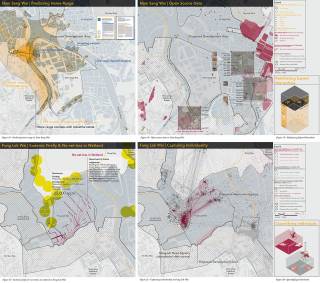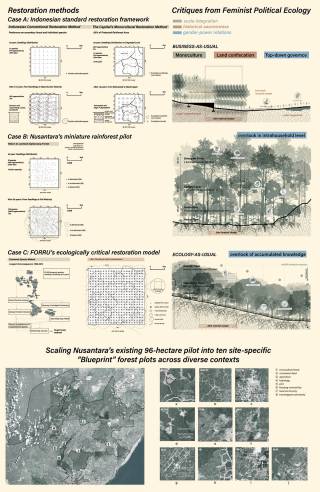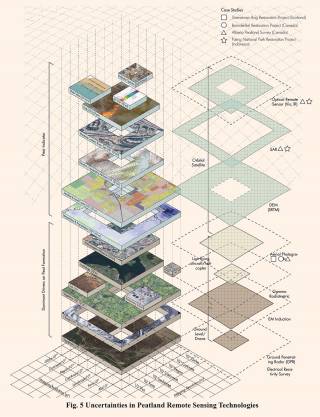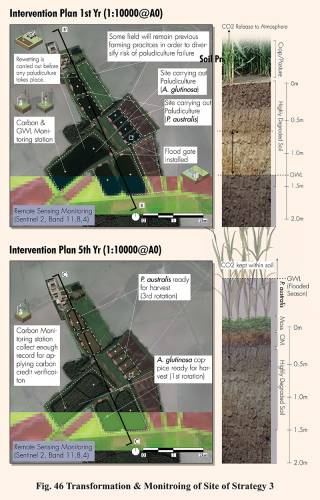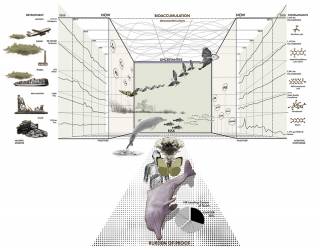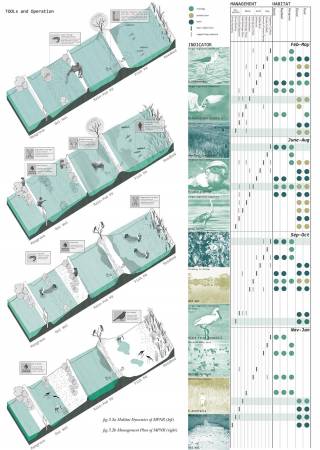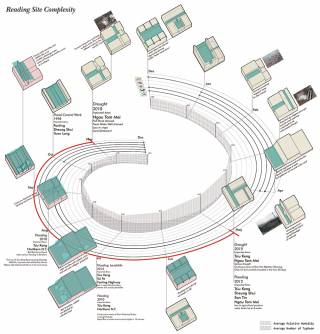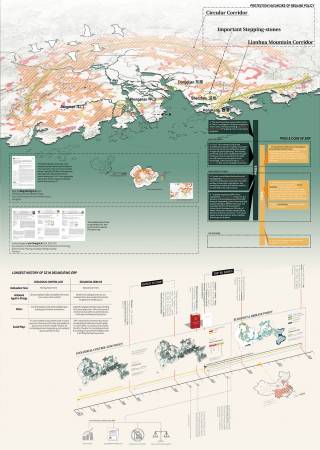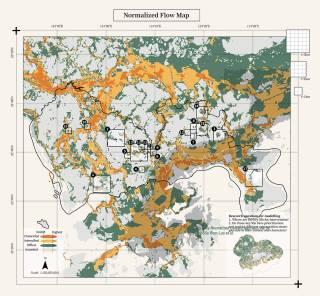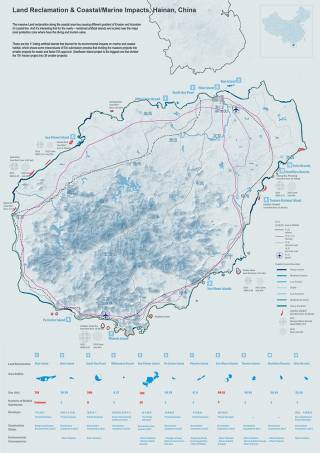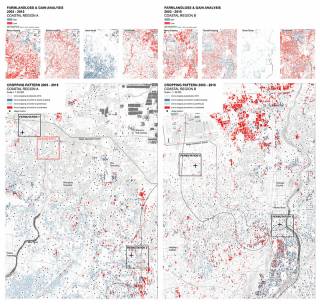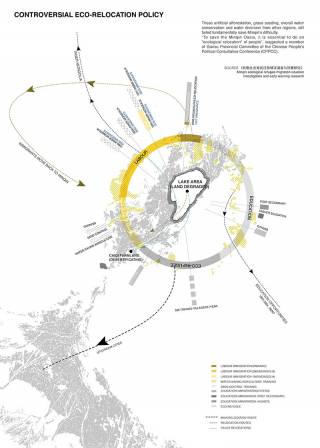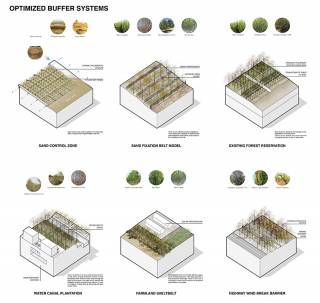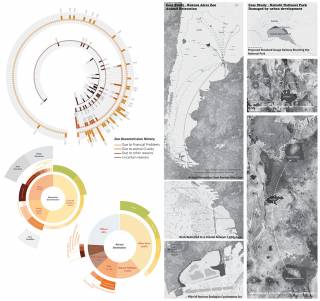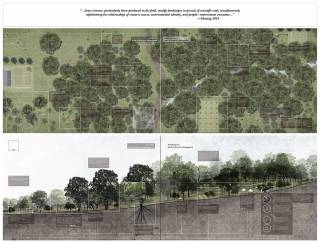Masters thesis section abstract:
This section welcomes landscape-driven theses covering the cultural-technical practices of environmental planning, management, assessment, activism, and governance in Greater China and Southeast Asia. With the emergence of new technologies for assessing, predicting, and monitoring landscape and ecological change, some anticipate a governance transition from the “environmental state” (生态立州) to the “predictive state”. Indeed, predictive technologies are prominent in applied landscape sciences and are leading towards the automation and securitization of conservation landscapes. For over 30 years, these landscapes across the Global South have been the domain of multilateral development banks and international environmental NGOs. However, new allegiances between state planning and development agencies, such as in China’s Ecological Redline Policy (生态红线) and Beautiful Villages Policy (美丽乡村), are extending planning institutions’ remit into sensitive non-urban landscapes and socio-ecological systems. How are planners and biologists coming together to create the predictive state? This raises key issues, not simply surrounding prediction and risk but also real-time monitoring and regulation, data archiving and access, and for participation and representation. Theses in this section will contribute to developing landscape architecture’s capacity to critically mediate such emerging cultural-technical practices, using strategies such as: novel forms of social and environmental impact assessment and public engagement; alternative value systems in the prediction of urban or rural ecosystem services; and countering the militarization of conservation and resource optimization. Long the arena of critical geography, the landscape architect finds disciplinary footing from 20th-century landscape planning, modern landscape ecology, contemporary landscape urbanism, and emerging landscape sciences. Design theses in this section are case-based and most will: (1) Survey an assemblage of built and unbuilt development and conservation projects, especially their remnant material landscapes; (2) Identify siloed approaches by political, environmental, and social agents; (3) Socialize in and appropriate (but not necessarily reproduce) analytical methods from landscape sciences; (4) Employ critical counter-mapping strategies; and (5) Generate speculative landscape planning proposals or scenarios that iteratively test the thesis and demonstrate a strong desire to intervene in the planning process.
Student theses:
Slow Science in Development: Ensuring principled ecological auditing for the Smart Earth era in Hong Kong's Northern Metropolis
By HUI Chun Sing
- 2nd Prize in China Resources Land Ltd.'s design competition for the Northern Metropolis named “Building with Imaginations, Envisioning the Future” Young Professional Design Award (2024).
- Presented at HKU Landscape's Public Review 2022.
- Exhibited at: Echeverri, N., Kelly, A. S., Kirchhoff, U., Wang, W., Chow, R. Y., Gutierrez, M. P., & McKay Alliende, T. (2023). Trading Bays: Resilience Design Strategies for San Francisco Bay Area and China's Greater Bay Area exhibition at Central Market Hong Kong. The University of Hong Kong & University of California, Berkeley.
- Presented at: Northern Metropolis Forum 3.0: Implementation in Action, hosted by the Hong Kong Institute of Architects (2024).
Abstract: The HKSAR Government announced The Northern Metropolis Development Strategy in the 2021 Policy Address, increasing already significant pressures on and around wetland habitats of international importance. To enable faster, more efficient development, the Policy Address suggested undertaking a comprehensive review of the Environmental Impact Assessment (EIA) process. Under that mandate in February 2022, the Environmental Protection Department (EPD) proposed a Centralized Environmental Database (CED) that would significantly alter Hong Kong’s EIA process, especially its Ecological Impact Assessment (EcoIA). Such a database must take into account significant ecological and institutional challenges or else risk following dangerous and unsustainable trends in Smart City (or “Smart Earth”) development. This thesis: Identifies strategic points of intervention in the EcoIA process that will enhance development decision-making; Proposes a new framework of ecological auditing following scientific principles for optimising the EIA process; and Outlines the required time and expertise to conduct EcoIA and surveys its challenges, especially regarding the current/future deployment of Smart City (or “Smart Earth”) technologies. To do this, this thesis uses a comprehensive Gantt chart to organize a review of scientific ecological studies and past development projects in Hong Kong that predate the Northern Metropolis but are nonetheless central to its development and future sustainability. The HKSAR Government’s four main proposals for “optimizing” the EIA process include: (1) introducing a Centralised Environmental Database (CED); (2) optimising the EIA process completion time to around 18 months for typical projects and around 24 months for major or complicated projects; (3) standardising the requirements of ecological baseline surveys, covering the methods, frequencies, and durations required for conducting the surveys for different types of ecological systems; and (4) conducting EIA studies in parallel with the detailed design of development projects. The Government’s four proposals will directly impact the effectiveness and quality of EcoIA due to the inherent complexity and uncertainty of ecological knowledge handled in the existing deliberative process. This thesis supports a new ecological auditing framework (i.e., a principled systematic follow-up process) that builds trust among stakeholders, recognises the importance of transparency as a process (especially when threatened by increasing technological innovation), and ensures EIA is not reduced to a pro forma process chasing to secure development permits. The ecological auditing process can be a key tool for enhancing the scientific merit, accountability and comprehensiveness of the EIA process and directing the Northern Metropolis Strategy towards more sustainable means and ends.
Forest landscape restoration through Feminist Political Ecology in Nusantara, Indonesia’s new “forest city” capital
By DU Jiani Jennie
- Presented at HKU Landscape's Public Review 2025.
Abstract: At the beginning of the UN’s Decade on Restoration campaign, a 2021 special issue of the Journal of Ecological Restoration surveyed applications of feminist political ecology (FPE) to the study and process of socially inclusive forest restoration. This thesis applies FPE’s three pillars of scale integration, historical awareness, and gender-power relations to East Kalimantan, where Indonesia’s relocated national capital of Nusantara plans to restore over 80,000 hectares of mostly oil palm plantations to a new rainforest in a “green forest city”, currently under construction. An additional 12,000 hectares are planned for food production agroforest. These oil palm plantations replaced 43.5% of the native lowland dipterocarp forests, transforming the region ecologically and socioeconomically since the 1980s with both local and transmigrant communities now living within these plantations. Environmental news site Mongabay reports the current restoration monoculture approach led by the environmental ministry is business-as-usual, is lagging behind the president’s plan, and is facing problems such as poor ecological conditions and lacking a masterplan, funding, and experienced labor. Meanwhile, the new capital’s development agency has established a 96-hectare miniature rainforest, located two-kilometer’s distance from Nusantara’s core government area, as a blueprint for tropical restoration, aiming to bring 150 native species back to East Kalimantan. Following FPE, restoration success should be measured not simply by outcomes but by process. This thesis’s methodology includes: (1) modifying both the standard Indonesian restoration frameworks and a more ecologically critical restoration model, by Thailand’s Forest Restoration Research Unit, according to the three pillars of FPE; (2) scaling Nusantara’s existing 96-hectare pilot into ten site-specific “blueprint” forest plots across diverse contexts, taking into account land use and land cover, demographics, flooding vulnerability, and historical livelihoods; (3) constructing scenarios for three plots with some of the most complex conditions; and (4) designing an alternative value chain system that provides a prioritized sequence of restoration that recognizes development uncertainties while accumulating landscape knowledge. The three complex scenarios include: (a) monoculture production forests with high flood vulnerability and delayed budgets; (b) transmigrant communities from Sulawesi who sought wage labor in East Kalimantan since 2000, who now present significant gender disparities and live on highly degraded concession lands with low-quality seedlings; and (c) local forest-based Dayak communities living on highly degraded concession lands threatened by land confiscation. By reframing resilience through FPE, the thesis contributes to moving beyond productivity-based schemes towards social inclusion, addressing development and ecological uncertainty, and shifting from outcome-based measurements to process-oriented success. This thesis offers ecologists a critical framework for accumulating socio-ecological knowledge, embedding social inclusion in restoration planning and practices, and addressing the significant socioeconomic, sociocultural, and sociopolitical gaps in Nusantara’s current planning regime.
Destabilizing expertise: A Landscape-knowledge bank for land justice and preemptive action in Hong Kong's non-indigenous squatter settlements
By HUI Sin Yee Jun
- Presented at HKU Landscape's Public Review 2024.
Abstract: Planning, civil engineering and environmental conservation, and especially these fields' institutionalization in government departments, manage Hong Kong's non-indigenous squatter settlements through environmental expertise. This thesis traces how that expertise is reproduced and offers a series of landscape strategies to destabilize dominant environmental expertise and promote these settlements' existing landscape stewardship. For decades, both squatter settlements and the landscapes they depend on have occupied ambiguous and marginalized positions, making them highly vulnerable to displacement or limiting resource access. While these settlements rarely receive academic or professional attention, the 2017 Wang Chau planning competition demonstrated an earnest attempt by the planning and design disciplines to address squatter settlements but also revealed these disciplines' limitations for offering and effecting land justice, whether in problem framing, process or proposing interventions. The research methodology includes: (1) constructing a database of squatter settlements in conflict with development proposals from a rigorous compilation of news media events; (2) categorizing and comparing the settlements, which led to selecting four sites in the New Territories that both have a high complexity of conflicts and are typologically distinct, including Fanling North NDA, Shek Lei Hang Village, Kon Hang, and Ma On Shan Village; (3) conducting site visits to document and reference the database on the ground; and (4) analyzing how expertise regarding squatter settlements is formed and deployed within individual government departments, particularly in ecological valuation and hazard management. The study concludes that most dominant ecological expertise is highly reductive and that hazard mitigation measures negatively impact inhabitants' livelihoods. Through design, the thesis proposes a catalog of thirteen maintenance strategies and four steps for countering existing dominant knowledge processes. The maintenance strategies are divided into three categories: ecological improvement, water regulation, and slope stabilization. These strategies are supported by and contribute to environmental knowledge accumulation, forming a coordinated landscape knowledge bank that encourages the preemptive participation of landscape architects and non-indigenous squatter inhabitants.
Producing peatland: Landscape strategies for reorienting the capital and habitus of peatland's scientific production in the United Kingdom
By LO Wai Ching
- Presented at HKU Landscape's Public Review 2021.
Abstract: Peatland benefits society and nature in diverse ways, including serving as ecologically important habitat, productive farmland, and an immense carbon sink. Global policy trends promoting carbon markets risk peatland management being reduced to a commercial practice, marginalizing both the current emphasis on ecological benefits and the authority of existing peatland management groups. This thesis in landscape architecture proposes a socio-technical system explicitly targeting reductive practices that have led to poor land management and significant environmental degradation. Using a hypothetical pilot site in East Anglia, United Kingdom, its design strategies produce peatland focusing on (a) ecological, (b) hydrological, and/or (c) alternative financial benefits while strategically organizing these approaches' varying implementation complexity, time investment, and uncertainty. Importantly, although natural forces shape peatland over geological timescales, the scope, function, and meaning of peatland is socially constructed. Technical peatland management practices and their entwined social networks and knowledge domains are also highly context-specific, as demonstrated by comparing UK management regimes with those in Europe, Russia, North America, and Indonesia. This thesis asserts that peatland production must be simultaneously socially plural and steered by rigorous ecological science, especially given broader trends neoliberalizing the production of science in applied ecology. The design strategies explicitly preference techniques promoting the authority of disadvantaged stakeholder groups in the decision-making, implementation and technologically diverse monitoring and maintenance processes of peatland production. Landscape architects, with unique capacity to leverage the social and political economy producing these landscapes, can help bridge the ecological science of peatland management with our mainstream planning institutions.
Scientists out of their habitat: Coordinating knowledge production and action for complex landscapes in China's Ecological Redline Policy
By YAU Hoi Ying Ariel
- Presented at: 5th APRU Sustainable Cities & Landscapes Conference, Honolulu, HI (2022).
Abstract: Ecological conservation redlines (“redlines”) are a set of recent policy initiatives under China’s Eco-Civilisation development approach that employs the concept of ecosystem services (ES) to delineate conservation priorities. Through studying a networked group of landscape ecologists’ approaches to redline delineation across China and mainland Southeast Asia, this thesis applies human geography and landscape architecture design methods to propose interventions in China’s current process of redline delineation that foreground the importance of collaboration between scientists and communities. In 2018, a group of landscape ecologists from Xishuangbanna Tropical Botanical Garden (XTBG), a top-tier research institution under the Chinese Academy of Sciences, developed a standardised framework of ecosystem assessments to inform land-use planning using predictive software, such as InVEST and MaxEnt, to delineate redlines for Shanghai municipality. These scientists later applied their framework for urban Shanghai to the entire mainland Southeast Asia, comprising both urban and sensitive rural ecologies. While not without differences, these landscape ecologists generally argued that redlines must be supplemented by additional planning measures to reflect broader biodiversity priorities. However, the delineation process they followed in Shanghai yielded a significantly reduced area of ES due to planners leading the stakeholder negotiation process. Indeed, academics in political ecology have criticised redlines as rendering conservation a primarily technical process that may further marginalise rural populations. Landscape architecture, with its focus on human-nature relationships, has the greatest capacity from within the design and planning disciplines to mediate between natural science and planning and to champion landscape ecologists’ recommendations on supplementing the redlines with sensitivity to social and environmental heterogeneity. To better equip landscape architects for coordinating the necessary expertise, this thesis applies social geographers Barnaud and Antona’s 2014 framework on the social construction of ES to China’s redline policy and process (1) to decipher why landscape ecologists and political ecologists diverge in their conservation priorities and approaches and (2) to explore what knowledge production processes may yield more appropriate conservation actions. Ten papers by landscape ecologists and political ecologists from or in collaboration with XTBG were analysed both qualitatively and spatially in GIS to identify divergences in these geographers’ and scientists’ preanalytic assumptions regarding ES. Scenario-building was then used as a tool to construct and reveal important interdependencies across scientists’ and communities’ conceptions of ES as necessary steps toward collective actions. Practical and redistributable tools such as interview questions and data collection sheets were designed as learning platforms. Ultimately, this thesis illustrates how narrow understandings of ES from landscape ecology reduce local actors’ capacities to supplement the redlines. Rural village planning must happen on a smaller but supplementary scale to China’s nationwide redline delineation process. The findings in this thesis serve as a primer for landscape architects who desire both to improve the institution of rural planning and to promote conservation with a more nuanced conception of ecosystem services in China and similar landscapes across Southeast Asia.
Green belt, grey belt? Non-zoned approaches to landscape evaluation and management in Hong Kong
By LI Man Hei Bernice
- Student Award, Hong Kong Institute of Landscape Architects (2018).
- Presented at HKU Landscape's Public Review 2017.
Abstract: Hong Kong's existing Country Parks, “green belts”, and a multitude of conservation-related zones conserve the territory's natural landscapes and resources. However, these designations are often weakly defined and susceptible to ever-increasing development pressures. By examining six sample sites representative of the Hong Kong's diverse threats to conservation, the work challenges zone-based planning and evaluation systems and suggests new methods of land categorization to increase the resiliency and manageability of Hong Kong's valuable natural areas. Using contested development plans for North Lantau Island as design test site, a more flexible yet less ambiguous approach is proposed to evaluate ecologically sensitive landscapes. This thesis extends landscape ecology's large-scale landscape gradient model, as an alternative to zone- or patch-based models, to small-scale sites by incorporating four aphysical value metrics: Conservation value; ecological value; redevelopment susceptibility; and manageability of the site. Two landscape management programs are proposed: 1) A productive landscape which encourages social and economic growth that is mutually benefiting the environment and villagers; and 2) a conservation landscape which conserves and restores the ecological legacies and its intactness. Both programs view rural landscapes as dynamic systems. Such a gradient approach can allow or facilitate the negotiation of social and ecological values across urban and natural areas.
An Environmental rationale: Strategies to reconcile the graduated sovereignty of northern China's eco-modernization programs
By AU YOUNG Chung Yan Samantha
- Published as: Au Young, C. Y. (2019). An Environmental Rationale: Strategies to reconcile the graduated interest of northwestern China's eco-modernization programs. Landscape Architecture Frontiers, 7(1), 138-149.
- Landscape and Planning Design, Silver Award, 15th National Annual Conference on Architecture and Design Education (2018).
- Presented at HKU Landscape's Public Review 2018.
Abstract: From 1980 to 2010, the Chinese government introduced a series of large-scale environmental programs across northwestern China, including Three-North Shelterbelt Program, Suspended Village Migration, 1236 Yellow River Irrigation Program, Natural Forest Protection Program, Sloping Land Conversion Program, and Converting Pastures to Grasslands Program. Focusing on the Ningxia Hui Autonomous Region, this thesis uses Emily Yeh's (2009) deployment of Ong's (2000) concept of “graduated sovereignty”, which theorizes the different modes of governing segments of the population, how these groups relate to global markets, and the different mixes of legal compromises and controls tailored to the requirements of special environmental zones. Overlapping histories and complex interactions amongst these eco-modernization programs have yielded diverse spaces of environmental governance. This thesis constructs a series of scenarios for the millions of refugees from these programs, tracing the overlaps and frictions of often coexisting programs that were defined as primarily either conservation- or economically oriented. Only through recognizing the heterogeneity of outcomes across these diverse landscapes can we find better ways to “green” northwestern China.
Catalyzing uncertainty and ecological risk: An Environmental archive for readying Hong Kong's plural ontologies
By Francisco CEVALLOS BARRAGAN
- Presented at HKU Landscape's Public Review 2020.
Abstract: Today, with a global environmental emergency alongside political battles for democracy and human rights, new strategies are needed to articulate trust and promote democratic environmentalist values, especially in contested regions. Contemporary society presents extreme discontents underpinned by ecological risk and an environment threatened by increasingly unchallenged dominant voices. Hong Kong’s environmental decision-making occurs within a laissez-faire economic system best described as neoliberalism with Chinese characteristics. Critical analysis of Hong Kong’s environmental governance system shows high relevance of advocacy groups, a lack of public participation, corporate pressure, weak institutions necessary for articulating various knowledges, and inadequate evaluation of the cumulative effects of environmental contamination. Following arguments across Hong Kong’s legal, health, information technology, and environmental sectors for the implementation of an archives law, this thesis proposes creating an Independent Environmental Archives Agency (IEAA) capable of collecting and representing evidence of cumulative impact, supporting process-oriented environmental governance, and “salvaging” (Choy, “Ecologies of Comparison”, 2011) scientific uncertainty for more sustainable development. Through a requirement of including the ontological perspectives of eight stakeholder groups with distinct yet closely aligned sustainability practices, this agency both effectively guarantees inclusion of diverse perspectives while also filtering knowledge and facilitating dialogue that privilege environmental uncertainty, longer-term objectives, and intergenerational equity. Examples of stakeholders include a director of corporate sustainability, an indigenous community leader, a Special Rapporteur to Hong Kong, a civil servant, an environmental activist, an environmental manager, and a developer-employed architect. Each stakeholder poses to the IEAA questions formed from distinct socio-political and disciplinary backgrounds (e.g., training in environmental law or corporate sustainability, degrees in social sciences or ecology, certificates in sustainable community governance), along with those backgrounds’ attendant biases and assumptions. A species-based approach helps further focus the selection of evidence and design of monitoring programs. The IEAA’s capacity for collecting, filtering and returning “data” from the archive on cumulative impact is improved as projects, assessments, and, most importantly, stakeholder queries are entered into and help strengthen its archive.
Making an environmental authority: Development, negotiation and the technical production of agricultural land under Hong Kong New Agriculture Policy
By CHONG Yan Suen Ceas
- Selected for HKU Landscape's Public Review 2019.
- Exhibited at: Echeverri, N., Kelly, A. S., Kirchhoff, U., Wang, W., Chow, R. Y., Gutierrez, M. P., & McKay Alliende, T. (2023). Trading Bays: Resilience Design Strategies for San Francisco Bay Area and China's Greater Bay Area exhibition at Central Market Hong Kong. The University of Hong Kong & University of California, Berkeley.
- Presented at: Northern Metropolis Forum 3.0: Implementation in Action, hosted by the Hong Kong Institute of Architects (2024).
Abstract: The Northern Metropolis will integrate agricultural programmes with urban planning, including multistorey farming, urban agriculture, and continued development of the Agricultural Park (Agri-Park)—a hub for agro-technology, knowledge transfer, and modern farm management established by the 2016 New Agriculture Policy. However, the drive towards modernisation raises critical questions about how productivity, sustainability, and conservation are defined and measured, especially as urbanisation accelerates in the New Territories. Additionally, the legacy of land-banking, land conversion disputes, development delays and cost overruns, benefits of supporting infrastructures, and farm leasing and production issues has heightened concerns about transparency and the potential prioritisation of private development interests. Drawing on the complex developmental and ecological legacies of Hong Kong, including numerous wetland and agricultural sites in the New Territories, this thesis offers a series of scenarios for the future of the Agri-Park that question our definitions of productivity and efficiency, biodiversity, land use categorisation and conversion, technical expertise and technology transfer, and implications of ownership versus stewardship. Rather than solely critiquing or deconstructing the land development process, this work explores futures that recognise the productive tensions in the government’s conservation mandates that allow it to make principled decisions amidst powerful financial and development interests. This work proposes alternative ways to articulate the Agri-Park's objectives and wields existing ecological and development metrics, such as risk and efficiency, to shift the development debate from physical planning to a more inclusive, negotiated space for all stakeholders.
Modulating connectivity: Applying the gradient paradigm to Ecological Redlines in the Greater Bay Area
By LAI Chuxuan Cindy
- Exhibited at: Echeverri, N., Kelly, A. S., Kirchhoff, U., Wang, W., Chow, R. Y., Gutierrez, M. P., & McKay Alliende, T. (2023). Trading Bays: Resilience Design Strategies for San Francisco Bay Area and China's Greater Bay Area exhibition at Central Market Hong Kong. The University of Hong Kong & University of California, Berkeley.
Abstract: Mandated in China's 2015 Environmental Protection Law, the Ecological Redline Policy (ERP) intends to conserve landscape patches or zones most conducive to regulating ecosystem services and is one of the most significant conservation policies of China's ecological civilization program. Indeed, Shenzhen experimented from 2005 through 2013 with several iterations of "ecological control lines", a precursor to the current Redline delineation methodologies used nationally. Although the ERP may significantly improve protection for water, soil, and biodiversity, several researchers highlight the need for increased focus on protecting ecological connectivity (i.e., ecological corridors that facilitate the reproduction, dispersal, and genetic diversity of species). Current research on the Greater Bay Area also suggests that large-scale ecological corridors and some important "stepping stones" remain in need of protection. Following recent advances in the field of spatial ecology, this thesis considers the landscape planning and management implications of studying ecological connectivity as a continuous gradient of animal movement, rather than earlier approaches that segregated the landscape into higher-value patches and lower-value remnants (i.e., matrix). Additionally, recent ecological connectivity studies for the Greater Bay Area and for Shenzhen, which while gradient-based, continue to propose discrete zones for conservation planning and management. This thesis reconsiders these approaches using two newer modelling principles: (1) by considering every location as a potential source and destination of ecological movement (i.e., wall-to-wall connectivity), and (2) by understanding ecological movement as having multiple meanings and implications, especially where ecological flows are channeled, intensified, diffuse or impeded. Lastly, there are fundamental limitations to a primarily zone-based approach to environmental conservation (i.e., redlines). This thesis thus identifies a diversity of landscape typologies, many of which require supplemental management strategies and designs beyond zone-based planning for effective conservation. Together, these modelling and design approaches offer important insights on how to best negotiate between the urgencies and uncertainties of ecological science and a practice of urban planning and sustainability.
Conservation watch: Nuanced modelling approaches for adaptive management of Hong Kong's conservation landscapes
By SHUM Siu Kei David
- Exhibited at: Echeverri, N., Kelly, A. S., Kirchhoff, U., Wang, W., Chow, R. Y., Gutierrez, M. P., & McKay Alliende, T. (2023). Trading Bays: Resilience Design Strategies for San Francisco Bay Area and China's Greater Bay Area exhibition at Central Market Hong Kong. The University of Hong Kong & University of California, Berkeley.
Abstract: The Hong Kong Agriculture, Fisheries and Conservation Department (AFCD) ranger division is tasked with monitoring the entirety of Hong Kong's country park network through routine patrols and monthly inspections. Encroaching development, eco-vandalism, and natural events such as annual hill fires negatively impact Hong Kong's landscapes and threaten its biodiversity. Advances over the past decade in machine-learning algorithms are optimizing patrolling in several parts of the world facing significant poaching threats. However, automation and greater efficiency have also militarized conservation, increasing the distance between experts and communities on-the-ground and threatening democratic participation and representation in environmental management. This thesis considers new tools, emerging technologies and the potential for public participation to enhance and assist in the monitoring and adaptive management of Hong Kong's countryside. Landscape architecture and planning in Hong Kong frequently refer to a standardized set of tools and maps to guide and justify development, including datasets describing land cover, landscape character and landscape value, and ecological value. This thesis problematizes the collation of many disparate and potentially controversial metrics of environmental value specific to Hong Kong, including: (a) accessibility for patrolling; (b) various proxies for biodiversity, species-richness, and endemism; (c) susceptibility to land conversion and future development; (d) legacies of eco-vandalism; (e) and illegal land sales and small-house trading. These hypothetical layers, although obviously partial, sometimes contradictory, and very difficult to consider cumulatively, are combined here abstractly to form a "heat map" of landscape vulnerability that might guide the development of conservation management strategies. Audio surveillance, drone thermal imaging, and optimized patrolling create real-time feedbacks between monitoring and regulation. Shifting from a primarily reactive to a proactive approach to environmental monitoring and management may safeguard Hong Kong's countryside; however, we must ensure such practices remain transparent, inclusive and accountable.
Bioremediation and blue tape: Regulating the uncertainty, assessment and negotiation of coastal development in Hainan
By KWOK Siu Man Mandy
- Published as: Kwok, S. M. (2020). Responsive bioremediation: Regulating the uncertainty, assessment, and negotiation for coastal developments in Hainan, China. Landscape Architecture Frontiers, 8(4), 152-163.
- Ecological health and sustainability category, Bronze Award, 16th Annual Asia Design Awards (2018).
Production atypical: State agricultural policy and divergent resource management for the coastal plains of Laizhou Bay
By JIN Jiayi Jason
- Presented at HKU Landscape's Public Review 2016.
Fragmentation in national desertification policy: Environmental management and relocation for eco-refugees, Northwest China
By ZHANG Zihui Ffion
- Best Design Project for Landscape Architecture, Silver Award, 13th Annual Asia Design Awards (2015).
Fabricating site: Modelling nuanced scenarios and design responses to China's national environmental programmes
By ZHUANG Zikai
The Phylogeography of environmental ethics: Regional landscape planning for China's decommissioning zoos
By OU Kaiyun Ivanka
Divergent landscape futures: Resilience scenarios for climate change, dam-building and regional development impacts on the Tonle Sap floodplain
By LU Jingrong Lawrence
Reconstructing regional conservation: Development synergies for Angkor's living temples, rural livelihoods and environmental stewardship
By ZHANG Boyang Marina
Justifying Sustainability: Environmental governance and the legitimacy of environmental analysis along the Myanmar-China border
By YUAN Zheyi Zoey
Longer-term landscape assessment: Feedback strategies for incorporating sustainability science in China's rural development planning
By WANG Xuting Julie
A Field science out-of-sight: Anticipating future forms of sustainable development for Kyrgyzstan's walnut-fruit forests
By XU Mingyang Simon
Constructing a land ethic: Relational assessment practices for rebuilding trust in land supply and land justice in Hong Kong
By CHAU Li Yin Sabrina


